-
 65 million viewers watched "Peter Pan" live becoming one of the "highest-rated TV production seen up to that time" starring Mary Martin (Producers' Showcase, para. 1). It aired ten days after closing on Broadway. Martin's favorite role was performing as Peter Pan because of the invisible wires that made it look like she was flying, which came across perfectly on television. Anyone who loves "Peter Pan" is recommended to watch the 1955 version with Mary Martin in it.
65 million viewers watched "Peter Pan" live becoming one of the "highest-rated TV production seen up to that time" starring Mary Martin (Producers' Showcase, para. 1). It aired ten days after closing on Broadway. Martin's favorite role was performing as Peter Pan because of the invisible wires that made it look like she was flying, which came across perfectly on television. Anyone who loves "Peter Pan" is recommended to watch the 1955 version with Mary Martin in it. -
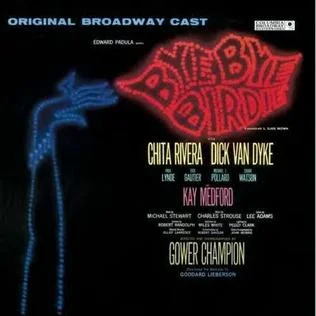 In the 1950's, rock made its presence into the theatre world. Green notes that "the two art forms had evolved separately and converged and because the original rock audience had matured into a theatregoing audience" (para. 4). While it didn't set off until the 1960's, "Bye Bye Birdie" (1960) was the first broadway musical to deal with rock music. American theatre finally began to feel the presence of rock and roll, which was most notably seen in the production "Hair" (1968).
In the 1950's, rock made its presence into the theatre world. Green notes that "the two art forms had evolved separately and converged and because the original rock audience had matured into a theatregoing audience" (para. 4). While it didn't set off until the 1960's, "Bye Bye Birdie" (1960) was the first broadway musical to deal with rock music. American theatre finally began to feel the presence of rock and roll, which was most notably seen in the production "Hair" (1968). -
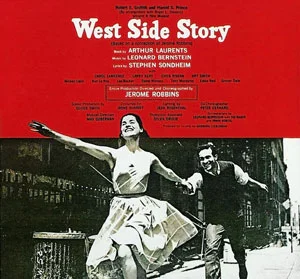 First performed September 26th, 1957, written by Arthur Laurents. This created a shift in modern musical theatre towards more serious themes rather than lighthearted work. Leonard Bernstein was the composer for the musical where it originally premiered in Washington D.C. August 19th, 1957. This musical is now one of the most "frequently performed of all American musicals" (Schwarm, para. 1).
First performed September 26th, 1957, written by Arthur Laurents. This created a shift in modern musical theatre towards more serious themes rather than lighthearted work. Leonard Bernstein was the composer for the musical where it originally premiered in Washington D.C. August 19th, 1957. This musical is now one of the most "frequently performed of all American musicals" (Schwarm, para. 1). -
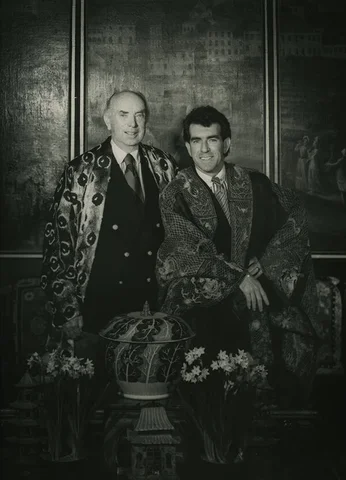 After graduating from Chouinard, helped create "special environments for the latest seasonal fashions" (Duquette, para. 1). Tony Duquette was a designer for multiple productions in musical theatre. Some of the productions were "Beauty and the Beast," "Yolanda and the Thief," "Lovely To Look At," and Tony award winning "Camelot" for 'best costume'. He played a huge hand in the development of costumes and set design.
After graduating from Chouinard, helped create "special environments for the latest seasonal fashions" (Duquette, para. 1). Tony Duquette was a designer for multiple productions in musical theatre. Some of the productions were "Beauty and the Beast," "Yolanda and the Thief," "Lovely To Look At," and Tony award winning "Camelot" for 'best costume'. He played a huge hand in the development of costumes and set design. -
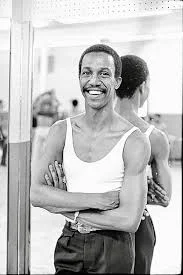 Faison was the first African American choreographer to win a Tony Award for his work in "The Wiz" (1975). He was inspired to join the theatre world after a performance with the Alvin Ailey company. After his move to New York City in 1966, his career began to take off. He became the "co-founder and producing artistic director of the Faison Firehouse Theatre", helping the youth find their artistic ability (Alvin Ailey Dance Foundation).
Faison was the first African American choreographer to win a Tony Award for his work in "The Wiz" (1975). He was inspired to join the theatre world after a performance with the Alvin Ailey company. After his move to New York City in 1966, his career began to take off. He became the "co-founder and producing artistic director of the Faison Firehouse Theatre", helping the youth find their artistic ability (Alvin Ailey Dance Foundation). -
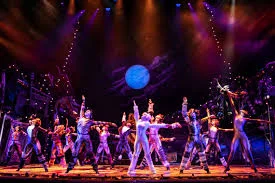 In the 1980's, musical theatre became mainstream. Musicals like "Cats," "Phantom of the Opera," and "Evita" had a bold stage presence. From revolving stages, special effects, and elaborate costumes, which created a visual experience for the audience. The 1980's fueled international success with universal themes, touring productions, and translations, making it accessible to the world. 80's musicals continue to inspire theatre today, pushing innovative and thought provoking musicals. (NewRetro)
In the 1980's, musical theatre became mainstream. Musicals like "Cats," "Phantom of the Opera," and "Evita" had a bold stage presence. From revolving stages, special effects, and elaborate costumes, which created a visual experience for the audience. The 1980's fueled international success with universal themes, touring productions, and translations, making it accessible to the world. 80's musicals continue to inspire theatre today, pushing innovative and thought provoking musicals. (NewRetro) -
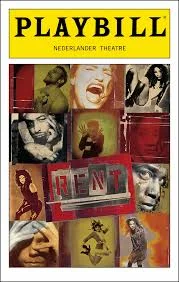 “Rent,” a groundbreaking rock musical, became known for its open discussion of people living with AIDS. Lunden notes that it "became an international phenomenon, winning the Pulitzer Prize and Tony Award, among others" (para. 1). The performance almost never began because Jonathan Larson tragically died from an aortic aneurysm the night before. The cast continued the performance in honor of his name where it went on to inspire people around the world to love and accept people as they are.
“Rent,” a groundbreaking rock musical, became known for its open discussion of people living with AIDS. Lunden notes that it "became an international phenomenon, winning the Pulitzer Prize and Tony Award, among others" (para. 1). The performance almost never began because Jonathan Larson tragically died from an aortic aneurysm the night before. The cast continued the performance in honor of his name where it went on to inspire people around the world to love and accept people as they are. -
 In the early 2000's, Jukebox musicals made a quick come back. "Movin' Out" first previewed September 30th, 2002, receiving multiple rewards for its overall performance. The musical features music and choreography rather than using dialogue to tell the story. "Mamma Mia" first premiered on broadway October 5th, 2001. It later wrapped up production Sep. 12 2015; however, after a successful movie release, they revived the production this year, reviving Jukebox musicals. (Playbill and Dziemianowicz)
In the early 2000's, Jukebox musicals made a quick come back. "Movin' Out" first previewed September 30th, 2002, receiving multiple rewards for its overall performance. The musical features music and choreography rather than using dialogue to tell the story. "Mamma Mia" first premiered on broadway October 5th, 2001. It later wrapped up production Sep. 12 2015; however, after a successful movie release, they revived the production this year, reviving Jukebox musicals. (Playbill and Dziemianowicz) -
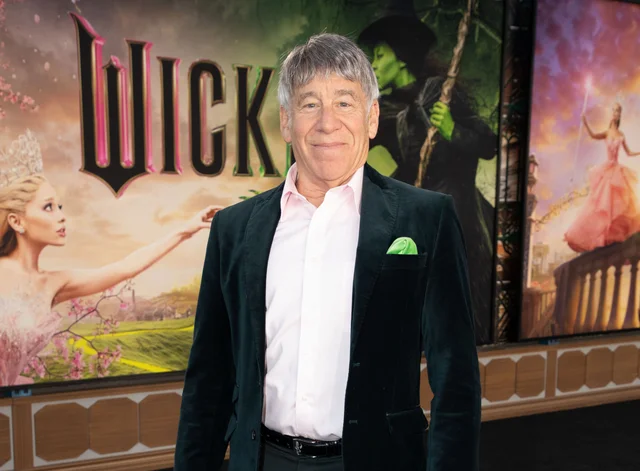 Schwartz is the composer and lyricist of the well-known musical, "Wicked". He won a Grammy Award for his work on the musical, one of the most successful productions. Scheps states that "It earned a GRAMMY Award for Best Musical Theater Album and has become a mega juggernaut in pop culture" (para. 3). He talked the production team out of turning "Wicked" into a movie in 1997, and convinced them to stick to a stage musical. Stephen Schwartz is now creating music for the new adaption of "Wicked".
Schwartz is the composer and lyricist of the well-known musical, "Wicked". He won a Grammy Award for his work on the musical, one of the most successful productions. Scheps states that "It earned a GRAMMY Award for Best Musical Theater Album and has become a mega juggernaut in pop culture" (para. 3). He talked the production team out of turning "Wicked" into a movie in 1997, and convinced them to stick to a stage musical. Stephen Schwartz is now creating music for the new adaption of "Wicked". -
 With the power of technology, it has become easier than ever to promote musicals. Jones notes that "Social media has made shows more accessible, more popular with younger audiences, and...even brought shows from little regional theatres all the way to Broadway itself" (para. 1). It brings visibility to small unknown playwrights, composers, and more. People are watching musicals now more than ever thanks to the help of Instagram, Facebook, Snapchat, TikTok, and more!
With the power of technology, it has become easier than ever to promote musicals. Jones notes that "Social media has made shows more accessible, more popular with younger audiences, and...even brought shows from little regional theatres all the way to Broadway itself" (para. 1). It brings visibility to small unknown playwrights, composers, and more. People are watching musicals now more than ever thanks to the help of Instagram, Facebook, Snapchat, TikTok, and more!